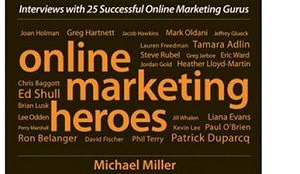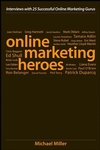
Wiley recently announced the launch of a new book, “Online Marketing Heroes: Interviews with 25 Successful Online Marketing Gurus”, in which TopRank has an entire chapter on the subject of social media marketing for SEO and PR.
The list of internet marketing experts interviewed for the book include consultants, agencies, CEOs, PR professionals, client side bloggers and marketers. Topics range from paid search to online copywriting to online PR and social media marketing. The list of marketing experts includes:
Joan Holman, Greg Hartnett, Jacob Hawkins, Mark Oldani, Jeffrey Glueck, Lauren Freedman, Tamara Adlin, Steve Rubel, Greg Jarboe, Eric Ward, Jordan Gold, Heather Lloyd-Martin, Chris Baggott, Ed Shull, Brian Lusk, Lee Odden, Jill Whalen, Liana Evans, Perry Marshall, Kevin Lee, Paul O’Brien, Ron Belanger, David Fischer, Phil Terry and Patrick Duparcq.
The majority interviewed are involved with search engines or search marketing so I reached out and asked those whom I am connected with to provide their unique perspectives and takeaways as a resource for our readers. Here is what they sent:
Ron Belanger – VP Agency Development Yahoo
It started out as a direct marketing medium, but today more and more traditional marketers–including brand marketers–are beginning to utilize search engine advertising.
- Use search advertising to take advantage of high-impact moments where a customer is interested in receiving a product or marketing message.
- Search marketing isn’t just for national advertisers; local businesses can use search marketing to target down to the individual market level.
- Social search lets you locate and communicate with passionistas–your most passionate brand advocates.
- Search advertising is a low-barrier, low-risk medium. It costs you very little to get started, and the potential results are huge. So dip your toe in the water and start advertising!
Kevin Lee – Executive Chairman and Co-Founder Didit
We are in the midst of a change in the advertising ecosystem and those marketers who embrace change with passion will triumph over those who fail to evolve with the massive shifts in consumer behavior and preference. Paid Search Marketing and Online Media is only the beginning of this macroeconomic shift in the way content and advertising is “consumed†by the consumer. Marketers will increasingly rely on data-driven models for media and advertising, but they better be sure the data is accurate and the models comprehensive. Bad data is sometimes worse than no data at all.
- Consumers are beginning to pay attention only to advertising that’s relevant to their needs.
- The way to reach consumers online is via narrowcasting a relevant message to each individual segment of your target audience; not by mass marketing a general message that everyone sees.
- Creativity in online marketing involves the ability to analyze data and formulate strategies based on that analysis.
- Search needs to be considered in relation to other forms for advertising; everything interacts with everything else; nothing is a silo onto itself.
- Carve out a portion of your marketing budget for experimentation with new media and advertising types.
Greg Hartnett – President BOTW
- Do your homework before you launch your business—establish an accounting system, obtain legal representation, do all the typical Business 101 stuff.
- Focus on the long haul—don’t expect to get rich quick.
- Incorporate web directories into your marketing mix, along with traditional search engine marketing.
- Strive for a mix of pay-per-click and organic search engine results.
- Hire the best possible individuals—and don’t be afraid to outsource nonessential activities.
Paul O’Brien – VP Marketing Zvents
If you want to convert local shoppers into customers, you need to take advantage of local search. That means doing the following things:
- Optimize your site for local search—make sure you include locality information as part of your keyword set.
- Focus on local directories as much as you do the big search engines.
- Think beyond the business listing. You’ll retain your customers with a business listing but attract customers with search engines like Zvents.
- Make sure you have a version of your site available that’s optimized for mobile devices.
- Include latitude and longitude information for inclusion in upcoming GPS-enabled devices.
Jill Whalen – CEO High Rankings®
My interview discussed how search engines and SEO in particular has changed over the years including:
- The search engines themselves have changed as the old ones we used to optimize for (AltaVista, Excite, Lycos, Infoseek, etc.) don’t even exist anymore, and Google is basically king of the hill.
- Google is so entrenched in the popular culture that it will be very difficult for them to be dethroned anytime in the near future.
- The incorporation of Universal Search could change the way we optimize websites, however, it’s still in its early days and my recommendation is not to stress about it just yet.
We also talked about the High Rankings SEO process, in general, as well as the importance of having a link-worthy website, doing extensive keyword research and making sure that when you design or redesign a website, you keep SEO in mind during that process and not think about it later as an afterthought.
Greg Jarboe – president and co-founder, SEO-PR
In particular, pay attention to these important issues:
- Pitch your press releases directly to consumers, via web search engines
- Optimize your press releases and online articles for best placement on Google News and other news search engines
- Think about what people are searching for, and write simple, easy-to-understand headlines accordingly
- Measure your PR results in terms of actual sales, not press clippings
- Recognize that blogs can drive more traffic to your site than traditional media–and treat bloggers as you would members of the mainstream press
- Get your PR people out of their own little silo and get them interacting with other members of your marketing and technology teams
Heather Lloyd-Martin – CEO SuccessWorks
Your Web page content is extremely important for two reasons. One, good content encourages higher conversion rates. The second reason is Google and the other engines stress that good content is important for strong search engine rankings. The trick is to write content that appeals to people and spiders. Here are some quick tips:
- Writing for your audience is extremely important. Some people think that all you have to do is shove keyphrases into your copy – and that’s just not true. Remember that the search engines don’t pay your bills – your customers do. Write copy that speaks to your prospects’ pain points, overcomes their objections and showcases why people should work (or buy) from you. Never sacrifice your copy’s tone and feel for the engines.
- Keyphrase research is the foundation of any SEO campaign (and the first step before writing a page.)
- Don’t be afraid to create scads of value-added content. If you know that your prospects value product reviews, offer them. If how-to articles are a big hit, create more if it makes sense. Your site will be seen as a valued resource through your efforts. Plus, articles are a great way to naturally drive incoming links.
- Choose your copywriter (or copywriters) carefully. It’s not true that “everyone is a writer.†Nor should someone from the IT department write your Web pages because they are “in charge of SEO.†A good writer can make a difference between so-so sales and rankings and high ranking copy that drives conversions like crazy.
- The search engine results page (SERP) is your first opportunity for conversion. Create Titles that, yes, include keyphrases – but also (when possible) include a benefit or call-to-action. Check out Zappos.com for a good example of this. Zappos promotes their free shipping in almost every Title. That’s smart SEO copywriting!
Li Evans – Director Internet Marketing KeyRelevance
- For the time being, Google, Yahoo!, Microsoft, and Ask are the most important search engines; the smaller players don’t have much chance of breaking through the ranks.
- Google is the big dog, of course, but other engines might be better to reach particular types of users.
- Even though search engines rank different factors differently, the same basic SEO techniques will help your ranking across the board.
- When optimizing your site, focus on relevant content first and link building second.
What I also drive home in the chapter is that “search marketing†isn’t about title tags and keyword densities anymore, search marketing has taken on a whole new meaning with the search engines trying to deliver the most relevant and engaging experiences for their users. Marketers need to realize, the days of “post-Florida†are gone, this is a whole new marketing medium that we ourselves need to adapt too.
Lee Odden – TopRank® and Online Marketing Blog
- Publish your media to different sites and channels to maximize the potential search engine hits—images to an image-sharing site, videos to YouTube, and so forth.
- All media are valuable, but none so much so as text, because of its importance to search engines.
- Most blog software is search-engine friendly out of the box and can provide a platform for delivering fresh content for the search bots.
- When content gets noticed and cited by multiple blogs, you get multiple links back to your main web site—which drives direct traffic and can increase search engine rankings.
- To succeed with social networking, you have to be transparent and honest. You must provide value in order to receive value.
You can order the “Online Marketing Heroes” hardcover book at Amazon.com
“Search Marketing Tips from Online Marketing Heroes” was originally posted at Online Marketing Blog.



